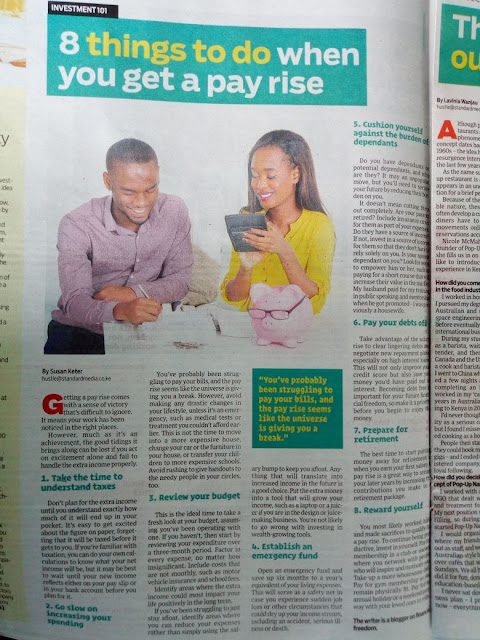What To Do After Getting a Pay Raise
NAIROBI, KENYA: Getting a pay rise comes with a sense of victory that’s difficult to ignore. It means your work has been noticed in the right places.
However, much as it’s an achievement, the good tidings it brings along can be lost if you act on excitement alone and fail to handle the extra income properly.
1. Take the time to understand taxes Don’t plan for the extra income until you understand exactly how much of it will end up in your pocket. It’s easy to get excited about the figure on paper, forgetting that it will be taxed before it gets to you. If you’re familiar with taxation, you can do your own calculations to know what your net income will be, but it may be best to wait until your new income reflects either on your pay slip or in your bank account before you plan for it.
2. Go slow on increasing your spending You’ve probably been struggling to pay your bills, and the pay rise seems like the universe is giving you a break. However, avoid making any drastic changes in your lifestyle, unless it’s an emergency, such as medical tests or treatment you couldn’t afford earlier. This is not the time to move into a more expensive house, change your car or the furniture in your house, or transfer your children to more expensive schools. Avoid rushing to give handouts to the needy people in your circles, too.
3. Review your budget This is the ideal time to take a fresh look at your budget, assuming you’ve been operating with one. If you haven’t, then start by reviewing your expenditure over a three-month period. Factor in every expense, no matter how insignificant. Include costs that are not monthly, such as motor vehicle insurance and school fees. Identify areas where the extra income could most impact your life positively in the long term. If you’ve been struggling to just stay afloat, identify areas where you can reduce your expenses rather than simply using the salary bump to keep you afloat. Anything that will translate into increased income in the future is a good choice. Put the extra money into a tool that will grow your income, such as a laptop or a juicer if you are in the design or juice-making business. You’re not likely to go wrong with investing in wealth-growing tools.
4. Establish an emergency fund Open an emergency fund and save up six months to a year’s equivalent of your living expenses. This will serve as a safety net in case you experience sudden job loss or other circumstances that could dry up your income stream, including an accident, serious illness or death.
5. Cushion yourself against the burden of dependants Do you have dependants or potential dependants, and who are they? It may an unpopular move, but you’ll need to secure your future by reducing their burden on you. It doesn’t mean cutting them out completely. Are your parents retired? Include insurance cover for them as part of your expenses. Do they have a source of income? If not, invest in a source of income for them so that they don’t have to rely solely on you. Is your spouse dependant on you? Look for ways to empower him or her, such as paying for a short course that will increase their value in the market. My husband paid for my training in public speaking and mentorship when he got promoted – I was previously a housewife.
6. Pay your debts off Take advantage of the salary rise to clear lingering debts and negotiate new repayment plans, especially on high interest loans. This will not only improve your credit score but also save you money you’d have paid out in interest. Becoming debt free is important for your future financial freedom, so make it a priority before you begin to enjoy the money.
7. Prepare for retirement The best time to start putting money away for retirement is when you earn your first salary. A pay rise is a great way to secure your later years by increasing the contributions you make to a retirement package.
8. Reward yourself You most likely worked hard and made sacrifices to qualify for a pay rise. To continue being productive, invest in yourself. Pay for membership in a club or society where you network with people who will inspire and motivate you. Take up a more wholesome diet. Pay for gym membership so you remain physically fit. Pay for an annual holiday or a weekend getaway with your loved ones to relax.
The writer is a blogger on financial freedom.
Read more at: https://www.standardmedia.co.ke/business/article/2001257729/eight-things-to-do-when-you-get-a-pay-rise
Financial Independence Africa

I was more than happy to find this site. I wanted to thank you for your time due to this fantastic read!! I definitely enjoyed every part of it and I have you book-marked to look at new information on your site.